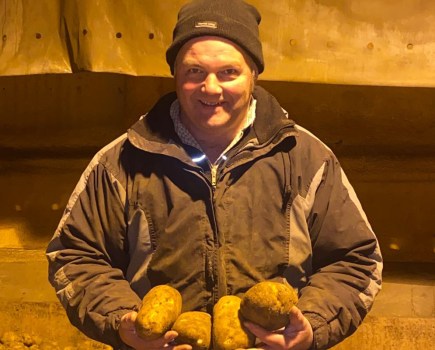By Martin Lines
What a year it’s been. I can’t remember any time when we’ve seen so much fluctuation in prices of inputs, fuel, and grain matched equally by as much instability and lack of leadership in Westminster. Extreme weather has hit home, and the tangibility of the climate crisis has brought stark reminders of how changing weather patterns will impact farm businesses, with the availability of water and high temperatures causing a significant impact on spring crops.
Speaking to farmers, many are deeply concerned about the water supply for irrigation and whether groundwater will be replenished this winter, coupled with the pressures of expensive inputs and energy. Some farmers are already changing cropping plans and rotations to lessen the risk to their businesses. With the cost of living affecting everybody, many supply chains aren’t willing to increase their purchase price on contracts to keep their market share and protect their customers from paying more. Those suppliers deciding not to pay a fair price above production costs may be in for a shock next spring and summer when supply is far short of demand.
On the farm, I’m looking back on our achievements and successes, as well as reflecting on the areas where we didn’t reach our goals. Our winter crops last year did very well but our spring crops, especially spring beans, were disappointing due to the lack of rain. The summer’s drought influenced changes in our rotation and refocused our efforts on getting our spring crops in as early as possible. Over the past few years, as our soil has improved so has its ability to carry machinery, so hopefully, we will catch an early window to plant the spring crops.
As farmers, we know all too well that short-term decisions have long-term impacts. If the market fails us or the proper support isn’t there, the immediate decisions we make on the farm come to fruition years later. I believe many politicians and buyers of supply chains neglect to consider that the changes farmers make to cropping now will have bearings long after.
Food security has been the topic of much debate this year, and the assessments of how we achieve it have brought mixed messages about its genuine contributors. While it’s easy to assume food production is synonymous with food security, in reality, the two aren’t mutually exclusive.
Agricultural land is continually degraded through unsustainable farming practices, undermining the natural assets farms rely on to produce food. Over the past two years, COVID-19, Brexit and global market turmoil have revealed the fragility of our food system. At a time when the war in Ukraine is driving price rises and shortages, food production is far from siloed from the consequences of unpredictable markets, economic shocks or the weather. At the same time, we have experienced the threat and reality of empty shelves and supply chain disruptions. Nature is in freefall in the UK, and levels of greenhouse gases in the atmosphere continue to mount. As the threat of climate change grows greater, the question of how we ensure food security for all could not be more urgent.
The protection offered by intact ecosystems is lacking across much of our farmland. We need healthy soil, weather resilience and abundant biodiversity to produce food sustainably and viably at a farm business level. The more we farm in balance with the natural environment, the less we depend on inputs. The more work within the capacity of the land, the less we erode its ability to handle extreme weather events. The greater diversity we build into our systems, the lesser the risk to our outputs. And most importantly of all, the sooner supply chains and the government support farmers in their transition to nature-friendly systems, the sooner we can ensure our self-sufficiency is built to last the trying times ahead.
I often hear farmers saying their role is solely about food production and feeding a growing global population. Yet only focusing on food production when more than half of what we produce does not directly feed people is the wrong campaign. Farmers have always produced a range of goods and services from the assets they manage from the landscape. Only focusing on one misses the vast opportunity to get support and funding for the other goods and services our land management provides.
Is a farmer who produces flowers, fibre, nature or timber not a real farmer because they produce less or no consumable food? Farmers not only feed the population’s stomach but also their hearts and minds. A farm is a multifunctional landscape, and no one is better positioned to deliver these multifaceted outputs as a farmer.
We must show governments and policymakers across the UK what we can deliver to provide lasting security through harnessing our natural assets in diverse ways. Without farmers, governments couldn’t deliver legally binding and international targets for climate mitigation, biodiversity recovery, and clean air and water. We need to rethink our food production and balance the outputs of what we produce.
As government budgets become under increased pressure over the next few years, we can demonstrate that a healthy landscape can not only feed people, but also protect them. Enjoying our British countryside can help with mental and physical health. Hopefully, we will see the Department of Health prescribing the benefits of nature and landscapes in improving public health. Defra’s budget is not the only budget agriculture should focus on for support in delivering land management.
Hopefully, by the time you’re reading this, Defra will have made it clear ELMs is staying and will clearly set out the different elements of the schemes and when they will be available. I wish everyone enjoyable Christmas and New Year celebrations.
This article was taken from the latest issue of CPM. For more articles like this, subscribe here.




